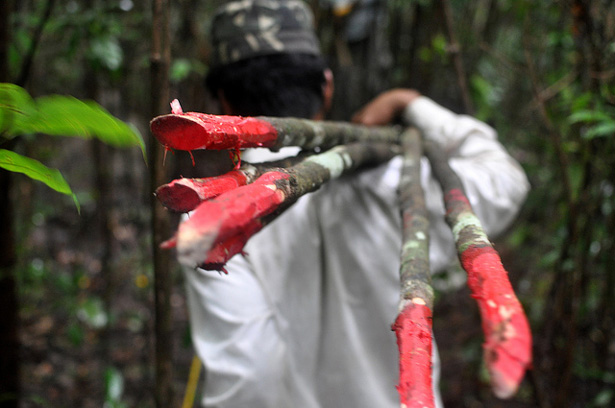-
Dark Forests: Interview With Bopha Phorn on Investigating Land Deals, Logging, Gender Issues in Cambodia
November 26, 2013 By Donald Borenstein
Cambodia is a young democracy in transition. It has the highest rate of urbanization in Southeast Asia, but the lowest percentage of current urban dwellers and widespread poverty. The Mekong River, on which millions of rural Cambodians rely, is being dammed at a rapid pace, both upstream, beyond the country’s borders, and within. Aided by weak land laws, both foreign and domestic industrial forces have staked claim to large swaths of the country for logging and rubber plantations, displacing thousands.
Bopha Phorn, editor-at-large for The Cambodia Daily, the country’s largest English-language newspaper, has amassed an impressive record of investigative coverage on logging, government land deals, dam construction, and gender issues, but not without considerable personal risk. She was recently in Washington, DC, to be honored by the International Women’s Media Foundation for courage in journalism, due in part to an investigation into illegal logging during which one of her companions was killed by military police.
Phorn has continued her investigative efforts in spite of increased government pressure. While she was in DC, we had a chance to talk to her about covering environmental corruption in Cambodia and the future of journalism in the burgeoning nation.
What motivated you to become a journalist?
I’ve wanted to be a journalist since I was very young, less than 10 as I remember, after I watched a movie about war. At that time Cambodia was pretty much controlled by Vietnamese soldiers. I knew that if we had journalists, we could read news regarding what is happening around us. After landing my job at the Daily, I have been inspired by my editors, colleagues, and the stories I have been working on to commit myself to writing news.
Environmental reporting has been a focus of yours. What are the biggest environmental stories in Cambodia?
The biggest environmental stories are illegal logging, which can impact climate change; land grabbing, which hurts people’s livelihood; and dams, which threaten all kinds of fish species with of extinction. Most indigenous people depend on wild products – such as rice, game, lumber, and bamboo – so when the woods are logged it impacts their livelihoods badly.
The Mekong River is a crucial source for the Cambodian people, providing millions living along the river with their livelihoods and food. China is investing in dams here, which is a good thing because Cambodia is still limited with regard to electricity access and it will soon be flooded with electricity. On the other hand, the dams will destroy many people’s livelihoods.
Cambodian land laws are a problem because it is hard to prove who has lived on a plot of land long enough to claim the land legally. This leads to controversies between the government and the people who live on the land. The major issue is that the government sometimes leases land to private companies that people have been living on or farming for generations.
Many Cambodians are not well educated enough that they can use their education to generate income, so they depend on natural resources such as water for fishing, land for farming, or wild products, particularly indigenous people. If there are shortages of these major natural resources, people will certainly face hardships.
You’ve also written about gender and recently cited unreported rape as one of the greatest crises in the country.
Rape is still a concern in Cambodia. The girls and women who have been raped tend to be quiet or dare not go to the court because they think they will never win their cases. Reticence is also due to the traditional pressure that if girls or women get raped and it is revealed, it might jeopardize their marred lives. In other cases, the victims are paid outside the court, so cases are closed without a conviction, or the victims are too poor to hire lawyers. The system and even victims themselves are too often apathetic towards these problems.
Between your experience with Chutt Wutty and the murder of environmental journalist Hang Serei Odom, it has been a stressful few years for the press. Can you talk about some of the difficulties reporting on these issues in Cambodia? Is it getting better or worse?
These two stories, I am sure, will hinder similar kinds of investigations in the future. At some point, it scares journalists off looking into details to write the stories. However, I hope that they will be in the back of journalists’ minds, reminding them that natural recourses are controlled by powerful people, and that the Cambodian people should keep fighting for their rights to enjoy the country’s natural wealth.
Most of the people who are involved with these kinds of businesses are powerful and rich. When it comes to the interviews for the stories’ content, it is hard. No one wants to talk about corruption, especially regarding land issues. Talking about corruption or revealing who is corrupt could lead to the loss of their position and interest in their jobs.
When it comes to reporting on gender issues, women are still timid in telling journalists about their issues. For example, with domestic violence or rape, girls and women in Cambodia tend to keep these issues as their personal problem and keep them secret, in an attempt to protect their family’s reputation.
I can’t really say it’s getting any worse or better. But I will say we need more female reporters to write about these issues.
Sources: The Cambodia Daily, Committee to Protect Journalists, International New York Times, International Women’s Media Foundation, The New York Times, UN-HABITAT, World Bank.
Photo Credit: Forest inventory in Siem Reap, Cambodia, courtesy of flickr user gardnergp. Video: Bopha Phorn accepts the 2013 IWMF Courage in Journalism Award in New York, courtesy of IWMF.
 A Publication of the Stimson Center.
A Publication of the Stimson Center.



